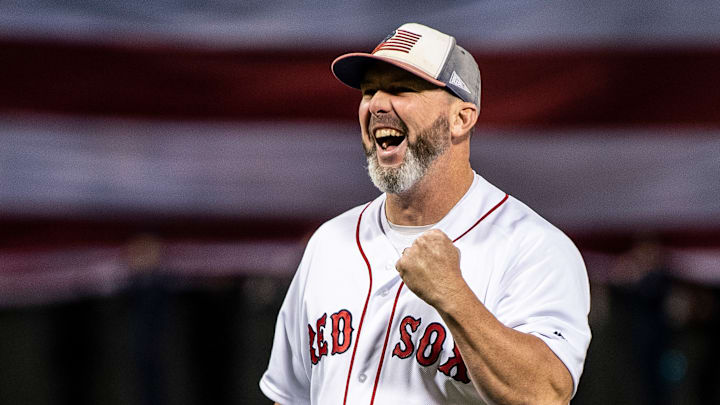Just what is a dirt dog? The origins trace back to the Red Sox and usually define a player who is hard-working, scrappy, tenacious, gritty, well-respected, and sometimes feared by teammates and opponents. I had heard the term applied many years before, although not precisely that term.
The year was 1960 as the Red Sox played a July 4 twin bill against the Orioles. The catcher for the O's was Clint Courtney. Courtney was small for a catcher, wore wire-rim glasses, and appearance-wise would look at home as a librarian. Looks are deceiving, and Courtney was known as "Scrap Iron" or "The Toy Bulldog." You can read about Courtney here.
There was a collision at home plate -- it was allowed back then -- and Courtney was ready to take on the base runner, Red Sox bench, fans, police, and anyone else there were no takers. A man beside me said, "Courtney is like my dog, all rolling in the dirt and ready to bite."
My first member is the one best associated with dirtdog, Trot Nixon. Nixon became a fan favorite, and as a right-field denizen, we let J.D. Drew know he was no Nixon. Defensively Nixon was fearless, and walls were just another challenge.
Trot Nixon personified the dirt dog mentality
Injuries took a harsh toll on Nixon, especially a back injury that shortened his career. With a fan base used to Dwight Evans, they were won over by lefty-hitting Nixon, who finished his Boston career with a .278 batting average and hitting .357 against the Cardinals in the 2004 World Series.
You can ask Lou Merloni all about the "Belleville Basher" or Brian Daubach, who injured teammate Merloni during a historic brawl against the Tampa Bay Rays. Daubach was front and center of this fray, and the Rays staff attempted to plug Daubach every at-bat.
Daubach was a lefty hitter with respectable power putting together four straight 20+ home run seasons (1999-2002). A first baseman by trade, Daubach would not win any Gold Gloves but was competent. The problem was hitting lefties - just a .217 career average. With Boston, Daubach hit .265 and was a member of the 2004 team.
In harm's way gets points, and shortstop Rick Burleson never flinched when pivoting on a double play. The "Rooster" was a Gold Glove shortstop, a three-time All-Star with Boston, and hit .274 for his Boston career.
To say Burleson was "intense" would be an understatement. Teammates and opponents noted his competitiveness and motor constantly running - his mouth and legs. Burleson was traded to the Angles and had a great 1981 season before an arm injury damaged his career.
Can a dirt dog be a star player? Just think of that noted gambler "Charlie Hustle," and the nickname says it all regarding the pugnacious Pete Rose. That jumps me to Dustin Pedroia, a baseball itch who could infuriate with his pointed and well-deserved comments. Just watching pictures of Pedroia taking grounders on his knees while recovering from his nth injury sums it up.
Pokey Reese's profile is listed as 5'11," and that is undoubtedly a "stretch" for those who remember the overachieving infielder. Reese had established himself in Cincinnati as a plus defended with offensive limitations.
Reese was latched on for shortstop and infield support with his defensive prowess and base-stealing ability. Nomar Garciaparra was in flux with contract issues and injuries, so Reese was ideal to shore up the defense. Reese's .221 average for Boston explains the downside.
Reese was a grinder as a player. Thankfully he was not an outfielder, or walls would become a tragic consequence for his style of play. Reese's reward for choosing the Red Sox over the Pirates as a free agent was a ring.
